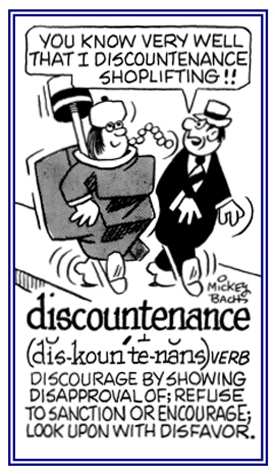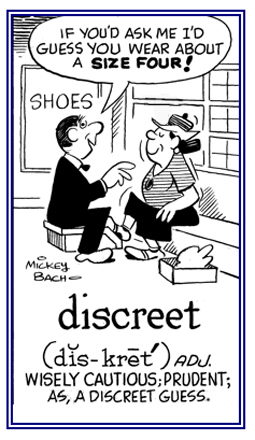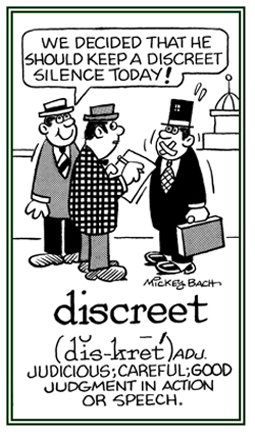dis-, di-, dif-
(Latin: separation, apart, asunder; removal, away, from; negation, deprivation, undoing, reversal, utterly, completely; in different directions)
The meaning of dis- varies with different words; dif-, assimilated form of dis- before f; di-, form of dis- before b, d, g, l, m, n, r, and v.
discount (verb), discounts; discounted; discounting
1. To deduct or subtract from a cost or the price of something.
2. To purchase or to sell (a bill, note, or other commercial paper) at a reduction equal to the amount of interest that will accumulate before it matures.
3. To lend money on (a commercial paper not immediately payable) after deducting the interest.
4. To sell or offer something for sale at a reduced price.
5. To reduce in quantity or value.
6. To underestimate the significance or effectiveness of something or someone; to minimize: "Her husband took care not to discount his wife's accomplishments."
7. To regard with doubt or disbelief.
2. To purchase or to sell (a bill, note, or other commercial paper) at a reduction equal to the amount of interest that will accumulate before it matures.
3. To lend money on (a commercial paper not immediately payable) after deducting the interest.
4. To sell or offer something for sale at a reduced price.
5. To reduce in quantity or value.
6. To underestimate the significance or effectiveness of something or someone; to minimize: "Her husband took care not to discount his wife's accomplishments."
7. To regard with doubt or disbelief.
discountable (adjective), more discountable, most discountable
1. Suitable to be reduced in price: The items in the store are all discountable for the customers during the last week of the winter season.
2. Worthy of being decreased, as an interest rate: Certain forms are necessary to render notes discountable at a bank.
2. Worthy of being decreased, as an interest rate: Certain forms are necessary to render notes discountable at a bank.
discountenance (verb), discountenances; discountenanced; discountenancing
1. To refuse to approve of something: Jake's family discountenanced smoking cigarettes and the excessive drinking of alcohol.
2. To disturb the composure of a person: Peggy was not discountenanced by her fellow student's accusation that she was cheating on the vocabulary test.

© ALL rights are reserved.
Go to this Word A Day Revisited Index
2. To disturb the composure of a person: Peggy was not discountenanced by her fellow student's accusation that she was cheating on the vocabulary test.

Go to this Word A Day Revisited Index
so you can see more of Mickey Bach's cartoons.
1. Someone who buys, sells, or lends money on financial instruments at a reduced price.
2. Anyone who discounts something as unimportant, irrelevant, or untrue.
3. A person who discounts something to lessen or to absorb its impact.
2. Anyone who discounts something as unimportant, irrelevant, or untrue.
3. A person who discounts something to lessen or to absorb its impact.
discourage (verb), discourages; discouraged; discouraged
1. To prevent, to dishearten, to crush: The fact that his birthday cake wasn't baked yet discouraged Jack a lot until his mother told him not to worry because it would be finished in time for the party.
2. To persuade another person not to do something: Sam tried to discourage his little brother from taking part in the swimming competition in their school.
2. To persuade another person not to do something: Sam tried to discourage his little brother from taking part in the swimming competition in their school.
discouragement
discouraging
discouragingly
A verbal or written expression or discussion on a particular theme, often in a formal setting: The audience found James’ discourse on installing ceiling fans informative and even entertaining.
A formal writer or speaker; someone who has much to say, often in an annoying manner: Anne is a talented discourser during the business meetings, but she usually talks beyond her time limit.
discredit (verb), discredits; discredited; discrediting
1. Loss or want of credit; impaired reputation; disrepute, reproach; an instance of this.
2. Loss or want of belief or confidence; disbelief, distrust.
3. To show to be unworthy of belief; to take away the credibility of; to destroy confidence in.
4. To injure the credit or reputation of; to bring into discredit, disrepute, or loss of esteem; to disparage, degrade, defame, and slander.
2. Loss or want of belief or confidence; disbelief, distrust.
3. To show to be unworthy of belief; to take away the credibility of; to destroy confidence in.
4. To injure the credit or reputation of; to bring into discredit, disrepute, or loss of esteem; to disparage, degrade, defame, and slander.
discreditably (adverb), more discreditably, most discreditably
Regarding how shame or dishonor disgraces someone's good name or reputation; disreputably: Susan's discreditably scandalous behavior caused her to lose her job.
discredited (adjective), more discredited, most discredited
Brought into discredit or disrepute; that which has lost credit.
Generally the theories we believe we call facts, and the facts we disbelieve we call theories.
discreet (dis KREET) (adjective), more discreet, most discreet
1. A reference to being careful to avoid embarrassing situations or upsetting another person: While waiting for a table at the elegant restaurant, Sally spoke to her mother in a very quiet and discreet tone of voice saying that her slip was hanging down below her dress.
2. Pertaining to not talking about anything that should be secret or confidential: The Jacksons invited their neighbors over for tea in the afternoon and they were very discreet and avoided asking about their daughter's recent divorce, knowing it was a painful subject.
3. Tactful and judicious; especially, in dealing with others; careful not to say or to do the wrong thing: Isaac made discreet inquiries about his daughter's bank account so she wouldn't spend more than is deposited in it.
4. Subtle and circumspect, ensuring that no undue attention distracts others: A photographer followed the bride and groom at a discreet distance so he wouldn't interfere with the wedding ceremony.
5. Etymology: from Latin, discernere, "to separate, to discern"; from dis-, "apart" + cerno, "pick".

© ALL rights are reserved.

© ALL rights are reserved.
Go to this Word A Day Revisited Index
2. Pertaining to not talking about anything that should be secret or confidential: The Jacksons invited their neighbors over for tea in the afternoon and they were very discreet and avoided asking about their daughter's recent divorce, knowing it was a painful subject.
3. Tactful and judicious; especially, in dealing with others; careful not to say or to do the wrong thing: Isaac made discreet inquiries about his daughter's bank account so she wouldn't spend more than is deposited in it.
4. Subtle and circumspect, ensuring that no undue attention distracts others: A photographer followed the bride and groom at a discreet distance so he wouldn't interfere with the wedding ceremony.
5. Etymology: from Latin, discernere, "to separate, to discern"; from dis-, "apart" + cerno, "pick".


Go to this Word A Day Revisited Index
so you can see more of Mickey Bach's cartoons.
discreetly (adverb), more discreetly, most discreetly
Relating to avoiding upsetting or embarrassing anyone and not to give away anything confidential: As a psychologist, Joe learned that to discreetly ask anyone for personal information involved respecting his or her privacy, to be diplomatic, and to keep such data a secret from others.


